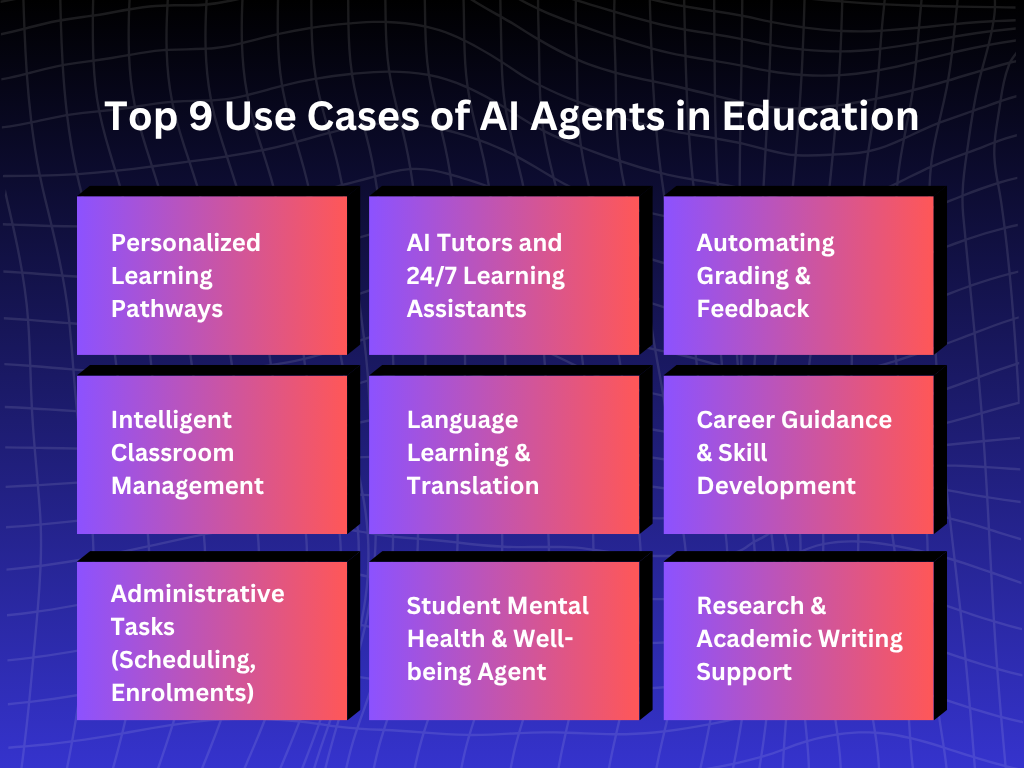
Top 9 Use Cases of AI Agents in Education (2025 Guide)

Imagine a classroom where every learner has a digital assistant that listens, adapts, and supports without ever getting tired. That is no longer science fiction. AI agents in education are already shaping how teachers work and how students learn.
The EdTech market keeps climbing, expected to cross $404 billion by 2025. But it’s not just about size—it’s about the way learning is being reshaped. AI agents are different from old software. They don’t just follow pre-set instructions; they act with autonomy, adapt to context, and collaborate with humans.
By the end of this guide, the reader will know the nine most powerful use cases of AI agents in classrooms, labs, and universities in 2025.
What Are AI Agents in Education?
Before diving into applications, it’s worth pausing. What exactly are AI agents in education? They are not just chatbots or grading tools. An agent is an autonomous system that can sense, plan, and act to support a task. Unlike traditional tools, automation workflows take initiative.
Key characteristics:
- Autonomy: Can run without constant human prompts.
- Personalization: Adapt responses to each learner’s progress.
- Task automation: Handle repetitive chores such as scheduling or grading.
- Collaboration: Work with teachers instead of replacing them.
Visual suggestion: A simple flow diagram of how an AI agent observes → reasons → acts in a classroom setting.
Generative AI in Learning
Generative AI is rapidly transforming the learning process by enabling truly personalized learning experiences for every student. Today’s AI agents, powered by advanced generative models, can automatically create educational content tailored to individual learning styles and objectives.
Whether it’s designing custom lesson plans, generating quizzes, or building interactive lessons, these AI powered learning tools adapt to each student’s pace and needs.
This technology goes beyond static resources—generative AI can produce virtual tutors that provide instant feedback, helping students tackle complex tasks and develop critical thinking skills on the spot.
For example, a student struggling with a math concept might receive a dynamically generated explanation or practice problem, while another student receives a creative writing prompt suited to their interests.
By leveraging AI, educational institutions can boost student engagement and deliver high quality, personalized learning support at scale. Teachers benefit too, as generative AI reduces their workload by automating content creation and routine feedback, freeing them to focus on mentoring and deeper teaching strategies. The result is a more engaging, efficient, and effective learning experience that drives better learning outcomes for all.
Human Interaction and AI
As AI agents become more integrated into education, the value of human interaction in the learning process remains irreplaceable. While AI systems excel at handling administrative tasks, analyzing data, and providing personalized support, human teachers bring essential qualities like emotional intelligence, empathy, and the ability to inspire creativity.
AI models can process vast amounts of student data and offer insights to improve student performance, but it’s the human teachers who interpret these insights and adapt their teaching strategies accordingly.
Human interaction is also crucial for building trust, fostering collaborative learning, and supporting students’ social and emotional development—areas where technology alone cannot suffice.
The most effective educational institutions are those that integrate AI powered systems to enhance, not replace, the human touch. By adopting AI agents to automate repetitive work and provide targeted resources, educators can devote more time to meaningful student engagement and high-impact teaching.
This balanced approach ensures that AI adoption in education leads to a richer, more holistic learning experience, where technology and human teachers work hand in hand to support every learner’s journey.
Top 9 Use Cases of AI Agents in Education
Each use case below includes a friendly explanation, examples from 2025, and the kind of impact that people rarely think about.

1. Personalized Learning Pathways
Every student learns differently. Some pick up math concepts fast but struggle with language. Others need more practice with science experiments. An AI agent creates learning journeys that adjust in real-time to strengths and weaknesses.
In 2025, personalization is not just about adaptive quizzes. Agents now analyze learning behavior across multiple subjects and recommend a complete pathway. For example, Squirrel AI in China and Carnegie Learning in the U.S. use agentic systems that alter the curriculum day by day.
Surprising angle: Many people don’t realize that agents also predict fatigue. If a student’s performance drops after three long tasks, the agent might suggest a short break or switch to a lighter exercise.
Quick benefits:
- Each learner gets a unique track.
- Teachers see where attention should go.
- Dropout risk decreases.
2. AI Tutors and 24/7 Learning Assistants
Teachers cannot be everywhere. But students often need help at midnight or on weekends. That’s where AI tutors step in.AI tutors such as Khanmigo (by Khan Academy) and Duolingo’s GPT-driven helper are available round the clock. These are not static FAQ bots. They guide problem-solving, ask reflective questions, and explain answers in multiple ways.
Surprising angle: Few know that AI tutors now use “learning style inference.” If a student responds better to visual explanations, the tutor adapts by showing graphs instead of text.
Quick benefits:
- Constant access for students.
- Reinforces lessons outside the classroom.
- Reduces pressure on teachers.
3. Automating Grading & Feedback
Marking papers eats up hours of teacher time. AI agents can now handle this with surprising accuracy.
Gradescope and Turnitin use agentic systems to evaluate essays, assignments, and quizzes. They not only give marks but also detailed feedback. In math, AI agents check each calculation step, not just the final answer.
Surprising angle: Some agents also compare grading patterns across teachers to spot inconsistencies. For example, they might highlight if one teacher grades stricter than another, helping schools balance fairness.
Quick benefits:
- Faster grading cycles.
- Consistent evaluation.
- Teachers gain back time for teaching.
4. Intelligent Classroom Management
Managing a classroom involves more than teaching. Attendance, disruptions, and time management can drain energy. Agents are stepping in here too.
In 2025, tools like ClassPoint AI and Edmodo AI assistants monitor attendance logs, track participation, and even predict which students might disengage during class.
Surprising angle: These systems can now detect early warning signs of dropouts by analyzing patterns like declining participation or late submissions across weeks. Teachers get nudges before the problem becomes severe.
Quick benefits:
- Predicts disengagement early.
- Simplifies routine tasks.
- Keeps classes on track.
5. Language Learning & Translation
Language barriers often stop students from reaching their best. AI agents now help learners communicate and understand material in multiple languages instantly.
Duolingo Max and Lingvist use AI tutors that adapt lessons to fluency levels. Classrooms are also experimenting with instant translation agents that subtitle lectures for non-native speakers.
Surprising angle: Some translation agents now pick up dialects and regional phrases. This allows a rural student in India to understand material that would otherwise feel foreign.
Quick benefits:
- More inclusive learning.
- Faster language practice.
- Students gain global exposure.
6. Career Guidance & Skill Development
Deciding a career is tough. Agentic AI is helping students match strengths with opportunities.
Platforms like Naviance AI and Coursera Coach use agentic systems to recommend courses, internships, and career tracks. Agents study not only grades but also extracurriculars and interests.
Surprising angle: In 2025, some systems also pull labor market data. For example, if cybersecurity jobs are rising, the agent might encourage a student strong in problem-solving to consider that path.
Quick benefits:
- Personalized career suggestions.
- Stronger link between school and job market.
- Reduces uncertainty for students.
7. Administrative Tasks (Scheduling, Enrolments)
Schools run on schedules, enrolments, and forms. Teachers often drown in paperwork. AI agents now do much of this.
For instance, systems like Ellucian AI automate course scheduling, handle enrolment records, and send reminders for deadlines.
Surprising angle: These agents can detect schedule conflicts automatically. If a student selects overlapping classes, the system suggests alternatives instantly—saving staff from sorting it manually.
Quick benefits:
- Saves hours of administrative work.
- Fewer scheduling errors.
- Faster service for students.
8. Student Mental Health & Well-being Agents
Mental health is as critical as academics. AI agents are starting to play supportive roles here.
Wysa and Woebot are AI well-being agents already helping students manage stress, anxiety, and exam pressure. They use conversational models trained on mental health frameworks.
Surprising angle: In 2025, some well-being agents analyze typing patterns and activity logs to predict stress spikes before a student even complains. This proactive support makes interventions timely.
Quick benefits:
- Early detection of stress.
- Accessible mental health support.
- Reduces the stigma of seeking help.
9. Research & Academic Writing Support
Writing papers and conducting research often feels overwhelming. AI agents are simplifying these academic tasks.
Tools like Elicit and ResearchRabbit act as research companions. They summarize academic papers, suggest citations, and even draft outlines.
Surprising angle: Some agents now check citation credibility, flagging papers from predatory journals. This prevents students from relying on poor-quality sources.
Quick benefits:
- Saves research time.
- Higher quality academic writing.
- Teaches students better research habits.
Benefits of AI Agents in Education
- Better student outcomes: Adaptive teaching keeps learners on track.
- Reduced teacher workload: Automation frees time.
- Inclusion: Translation and personalization open doors for all.
- Data-driven insights: Trends show up early, allowing action.
Challenges & Ethical Concerns
- Data privacy: Sensitive student data needs careful handling.
- Over-reliance: Students may depend too much on AI help.
- Bias: Agents can replicate biases in data.
- Teacher training: Teachers need support to use agents wisely.
Future of AI Agents in Education
Looking ahead to 2030, schools that adopt early will build stronger systems. Agents may soon handle predictive learning, suggesting not only next lessons but also life skills. Universities could assign AI co-teachers who adjust entire courses in real time.
Those starting now will gain a head start.
Conclusion
AI agents are not here to replace teachers. They are here to multiply impact, cut down workload, and open new ways of learning. The future of education will be built on collaboration between human teachers and digital assistants.
At Ampcome, we help enterprises build AI agents customized for their data and workflows. From knowledge management to learning systems, our approach adapts AI to your context. If you’re curious about AI agents in education, stay tuned—our upcoming reviews will dive deeper into the best tools for teachers and students.
FAQs
Q1: What is an AI agent in education?
It’s an autonomous system that assists with teaching, learning, or administration by sensing, planning, and acting without constant prompts.
Q2: How are AI agents different from chatbots?
Chatbots respond to queries. AI agents act with autonomy, run processes, and adapt their behavior over time.
Q3: What are examples of AI agents used in schools today?
Examples include Khanmigo (AI tutor), Gradescope (grading assistant), and Wysa (student well-being).
Q4: How can teachers use AI agents effectively?
Teachers can rely on them for grading, personalized lesson suggestions, or monitoring student engagement.
Q5: Will AI agents replace teachers in the future?
No. They will support teachers by automating repetitive work and providing data insights, but human mentorship remains irreplaceable.

Transform Your Business With Agentic Automation
Agentic automation is the rising star posied to overtake RPA and bring about a new wave of intelligent automation. Explore the core concepts of agentic automation, how it works, real-life examples and strategies for a successful implementation in this ebook.
More insights
Discover the latest trends, best practices, and expert opinions that can reshape your perspective
Contact us












